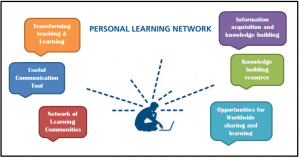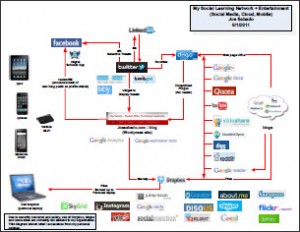One benefit of formal education is that students are provided guidance throughout their learning process via the curriculum of their studies. Students are given materials and resources to study from and good teachers not only provide the knowledge and expertise but act as mentors in the education process. Self-directed learners, those who are motivated to learn on their own outside the structure of formal education, face challenges students in formal settings may not necessarily have to deal with. They also have the freedom to design their learning experience that may not be available to students in formal institutions. I am one of those self-directed learners. Using social media and personal learning networks, I have been able to teach myself about topics related to student affairs including student development theory, technology in student affairs, higher education issues, technology, instructional design, social media and management and leadership.
In the course of learning about these topics, I have had to also learn the process of learning itself. I have had to figure out how to use technology, including social media, and my personal learning networks towards my goal of learning about the aforementioned topics. When I joined twitter on August 9, 2010, I could not have imagined the power of personal learning network and powerful social media are when it comes to informal learning. I have learned a lot since then and the learning process included adjustments along the way. Based on my experience, here are some ideas to consider:
Identify areas of study to pursue. For example, I wanted to learn about student affairs but I didn’t know where to start. I reviewed several student affairs graduate programs online to determine topics to study. In addition, I also regularly monitored topics being discussed on #sachat and #highered. Monitoring the two hashtags provided me a sense of who are the credible contributors/thinkers which led me to reading their blogs.
Experiment with learning resources and adjust accordingly. When I shared a diagram of my “social learning network” on twitter, there were a couple of folks who couldn’t believe the number of social networks I use. The diagram actually includes social networking sites I experimented with but may not use regularly. I had to figure out which sites are best suited for learning specific topics. There are sites like Quora and Google+ I rarely use now since I don’t find these sites as valuable as twitter and blogs when it comes to learning about student affairs and higher ed. In the last year, I discovered e-books (kindle) and added them my learning resources. I also started using Evernote as a site to store pretty much anything including notes, photos, web clippings, etc. The beauty and danger of the web and social media is that while there are so much information to consume, it’s easy to get distracted and waste time reading materials not relevant to your areas of study. I think part of digital literacy is the ability to recognize which resources are credible and which ones should be filtered and ignored.
Have a plan and a self-imposed discipline to go with it. There are no deadlines to meet and professors to nudge you to keep learning. Having a plan, including what areas of topics to learn and when to focus on them, is very important. However, be flexible enough in your plan to allow opportunities for experimentation.
This post was meant to provide some general approach to using social media and personal learning networks for self-directed learning. I hope you were able to get some ideas you can apply towards your informal learning. What other ideas would you add?
image credit: http://jfondas.wordpress.com


